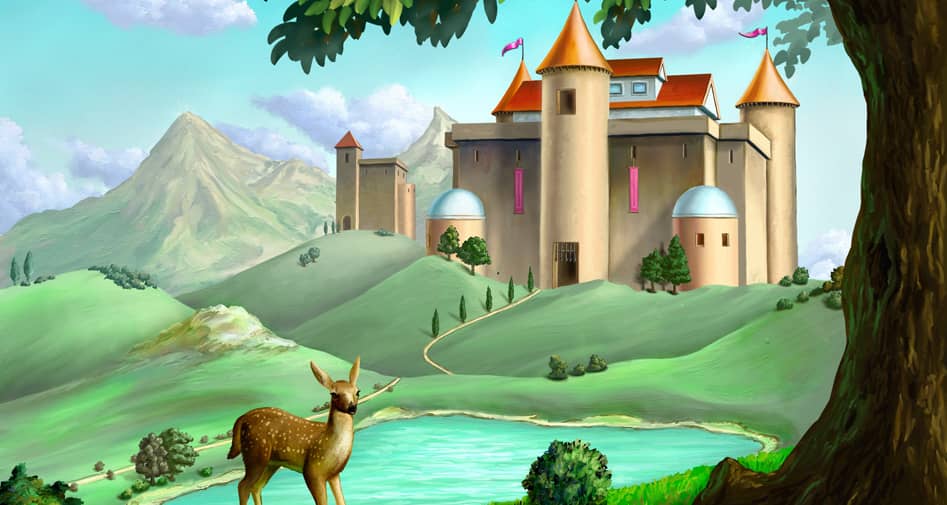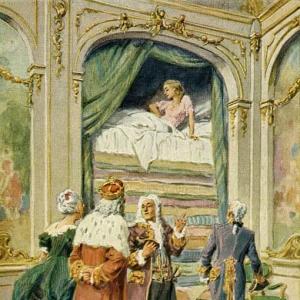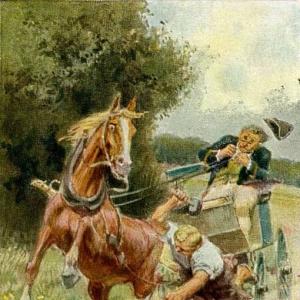Reading time for children: 9 min
Attention: This is a scary story.
There was once a King’s son who was seized with a desire to travel about the world, and took no one with him but a faithful servant. One day he came to a great forest, and when darkness overtook him he could find no shelter, and knew not where to pass the night. Then he saw a girl who was going towards a small house, and when he came nearer, he saw that the maiden was young and beautiful. He spoke to her, and said, „Dear child, can I and my servant find shelter for the night in the little house?“
„Oh, yes,“ said the girl in a sad voice, „that you certainly can, but I do not advise you to venture it. Do not go in.“ – „Why not?“ asked the King’s son. The maiden sighed and said, „My step-mother practises wicked arts. She is ill-disposed toward strangers.“ Then he saw very well that he had come to the house of a witch, but as it was dark, and he could not go farther, and also was not afraid, he entered. The old woman was sitting in an armchair by the fire, and looked at the stranger with her red eyes.
„Good evening,“ growled she, and pretended to be quite friendly. „Take a seat and rest yourselves.“ She blew up the fire on which she was cooking something in a small pot. The daughter warned the two to be prudent, to eat nothing, and drink nothing, for the old woman brewed evil drinks. They slept quietly until early morning. When they were making ready for their departure, and the King’s son was already seated on his horse, the old woman said, „Stop a moment, I will first hand you a parting draught.“
Whilst she fetched it, the King’s son rode away, and the servant who had to buckle his saddle tight, was the only one present when the wicked witch came with the drink. „Take that to your master,“ said she. But at that instant the glass broke and the poison spirted on the horse, and it was so strong that the animal immediately fell down dead. The servant ran after his master and told him what had happened, but would not leave his saddle behind him, and ran back to fetch it. When, however, he came to the dead horse a raven was already sitting on it devouring it.
„Who knows whether we shall find anything better today?“ said the servant. So he killed the raven, and took it with him. And now they journeyed onwards into the forest the whole day, but could not get out of it. By nightfall they found an inn and entered it. The servant gave the raven to the innkeeper to make ready for supper. They had, however, stumbled on a den of murderers, and during the darkness twelve of these came, intending to kill the strangers and rob them. Before they set about this work, they sat down to supper, and the innkeeper and the witch sat down with them, and together they ate a dish of soup in which was cut up the flesh of the raven.
Hardly, however, had they swallowed a couple of mouthfuls, before they all fell down dead, for the raven had communicated to them the poison from the horse-flesh. There was no no one else left in the house but the innkeeper’s daughter, who was honest, and had taken no part in their godless deeds. She opened all doors to the stranger and showed him the heaped-up treasures. But the King’s son said she might keep everything, he would have none of it, and rode onwards with his servant.
After they had traveled about for a long time, they came to a town in which was a beautiful but proud princess, who had caused it to be proclaimed that whosoever should set her a riddle which she could not guess, that man should be her husband; but if she guessed it, his head must be cut off. She had three days to guess it in, but was so clever that she always found the answer to the riddle given her, before the appointed time. Nine suitors had already perished in this manner, when the King’s son arrived, and blinded by her great beauty, was willing to stake his life for it.
Then he went to her and laid his riddle before her. „What is this?“, said he. „One slew none, and yet slew twelve.“ She did not know what that was, she thought and thought, but she could not find out, she opened her riddle-books, but it was not in them — in short, her wisdom was at an end. As she did not know how to help herself, she ordered her maid to creep into the lord’s sleeping-chamber, and listen to his dreams, and thought that he would perhaps speak in his sleep and discover the riddle.
But the clever servant had placed himself in the bed instead of his master, and when the maid came there, he tore off from her the mantle in which she had wrapped herself, and chased her out with rods. The second night the King’s daughter sent her maid-in-waiting, who was to see if she could succeed better in listening, but the servant took her mantle also away from her, and hunted her out with rods. Now the master believed himself safe for the third night, and lay down in his own bed. Then came the princess herself, and she had put on a misty-grey mantle, and she seated herself near him.
And when she thought that he was asleep and dreaming, she spoke to him, and hoped that he would answer in his sleep, as many do, but he was awake, and understood and heard everything quite well. Then she asked, „One slew none, what is that?“ He replied, „A raven, which ate of a dead and poisoned horse, and died of it.“ She inquired further, „And yet slew twelve, what is that?“ He answered, „That means twelve murderers, who ate the raven and died of it.“ When she knew the answer to the riddle she wanted to steal away, but he held her mantle so fast that she was forced to leave it behind her.
Next morning, the King’s daughter announced that she had guessed the riddle, and sent for the twelve judges and expounded it before them. But the youth begged for a hearing, and said, „She stole into my room in the night and questioned me, otherwise she could not have discovered it.“ The judges said, „Bring us a proof of this.“ Then were the three mantles brought thither by the servant, and when the judges saw the misty-grey one which the King’s daughter usually wore, they said, „Let the mantle be embroidered with gold and silver, and then it will be your wedding-mantle.
 Learn languages. Double-Tap on one word.Learn languages in context with Childstories.org and Deepl.com.
Learn languages. Double-Tap on one word.Learn languages in context with Childstories.org and Deepl.com.Backgrounds to fairy tale „The Riddle“
„The Riddle“ is a fairy tale collected by the Brothers Grimm, included in their compilation „Grimm’s Fairy Tales“ (originally titled „Children’s and Household Tales“ or „Kinder- und Hausmärchen“ in German), first published in 1812. The story is classified as ATU 851 (Winning the Princess with a Riddle) in the Aarne-Thompson-Uther classification system, which categorizes folktales based on their narrative structure and elements.
As with many other stories collected by the Brothers Grimm, „The Riddle“ likely has roots in European oral storytelling traditions. Jacob and Wilhelm Grimm were German academics and cultural researchers who aimed to preserve the cultural heritage and oral storytelling traditions of German-speaking regions. They collected and published numerous folk and fairy tales during the 19th century, with many of these tales reflecting the values, beliefs, and societal norms of the time.
The story also incorporates elements of the „clever hero“ archetype, which is commonly found in fairy tales and folklore. This archetype often features a protagonist who uses their intelligence and resourcefulness to overcome obstacles and achieve their goals, as opposed to relying on physical strength or magical powers. „The Riddle“ shares similarities with other European folktales that involve riddles, demonstrating the cultural significance of riddles and puzzle-solving as a test of wit and intelligence in traditional storytelling.
The Brothers Grimm collected and published over 200 folktales in their book „Kinder- und Hausmärchen“ (Children’s and Household Tales), which first appeared in 1812. The collection has since gone through multiple editions and translations, becoming one of the most well-known and widely-read collections of fairy tales in the world. The stories have inspired numerous adaptations in literature, theater, and film. The tales collected by the Brothers Grimm often feature supernatural elements, moral lessons, and archetypal characters, including witches, kings, princesses, and magical creatures. These stories were primarily passed down through oral tradition, which allowed the tales to evolve over time and reflect the values and beliefs of the communities from which they originated.
„The Riddle“ is a lesser-known tale from the Brothers Grimm collection. Like many of their other stories, it includes a blend of fantasy elements, adventure, danger, and moral lessons. It highlights themes such as greed, deceit, cleverness, loyalty, and redemption, which are common in other Grimm fairy tales.
Interpretations to fairy tale „The Riddle“
„The Riddle“ from the Brothers Grimm offers several interpretations that highlight the depth and complexity of their collected fairy tales. Some key interpretations of the story include:
The dangers of greed and deceit: The witch, the murderers, and the proud princess all act out of greed and deceit, which eventually lead to their own downfalls. The witch’s attempt to poison the travelers leads to the horse’s death, the murderers‘ attempt to rob and kill the travelers leads to their own deaths, and the princess’s attempts to learn the answer to the riddle through dishonest means ultimately forces her to marry the King’s son.
Cleverness and loyalty as virtues: The King’s son and his servant rely on their wit and loyalty to one another to overcome the challenges they face. The servant’s cleverness saves them from being poisoned by the witch and protects the King’s son from the princess’s dishonest attempts to learn the riddle’s answer. The servant’s loyalty is also evident in his insistence on retrieving his saddle, which results in obtaining the raven that becomes central to the riddle.
The power of riddles and knowledge: The King’s son’s riddle showcases the power of knowledge and the consequences of gaining it through dishonest means. The riddle serves as a test for the princess, and her inability to solve it without cheating exposes her true nature. In the end, the King’s son’s riddle brings about justice and a transformative moment for the princess.
The consequences of pride and arrogance: The princess’s pride and arrogance are evident in her challenges to her suitors, expecting them to solve a riddle or face death. Her inability to accept defeat and resorting to deceit to maintain her pride ultimately force her to marry the King’s son.
Transformation and redemption: The story also carries a theme of transformation and redemption, particularly for the princess. By the end, she is humbled by her inability to solve the riddle and her exposure as a cheater. Through her marriage to the King’s son, she is presented with an opportunity for redemption and personal growth.
These interpretations of „The Riddle“ highlight the themes and messages that continue to resonate with readers today, showcasing the timeless appeal and depth of the Brothers Grimm’s fairy tales.
Adaptions of the fairy tale „The Riddle“
„The Riddle“ is a German fairy tale collected by the Brothers Grimm, also known as Jacob and Wilhelm Grimm, who were 19th-century German academics and authors. They are best known for their compilation of traditional folktales, which they recorded as a part of their broader efforts to preserve and document German culture and language. While „The Riddle“ may not be as widely adapted as some of the more famous Brothers Grimm fairy tales, there have been some adaptations and reimaginings of the story in various formats. Some specific examples include:
Picture books: Various illustrated editions of Grimm’s fairy tales include „The Riddle,“ offering an engaging visual experience for readers. These illustrated versions often bring to life the story’s imaginative elements, allowing young readers to better understand and appreciate the tale.
Films: The story has been adapted into several films, including the 1961 Czechoslovakian film „Three Wishes for Cinderella“ and the 2004 German film „The Riddle Knight.“
Literature: The tale has been adapted and retold in various literary works, such as Diana Wynne Jones‘ book „The Crown of Dalemark“ and Neil Gaiman’s short story „The Troll Bridge.“
Television: The story has been adapted for television, such as in the episode „The Riddle of the Riddle“ from the animated series „Grimm’s Fairy Tale Classics“ and the episode „The Riddle of the Sphinx“ from the BBC series „Merlin.“
Animation: „Simsala Grimm“ (1999-2010): A German animated television series that reimagines Grimm’s fairy tales, including an episode based on „The Riddle.“ The series puts a modern spin on the classic tales, presenting them to a new generation of viewers.
Theater: Some theatrical productions have adapted „The Riddle“ as part of larger performances or productions focused on the Brothers Grimm’s fairy tales. These adaptations often emphasize the story’s themes of wit, intelligence, and loyalty, while presenting the tale in a live performance format. The tale has been adapted into stage productions, such as the play „The Riddle of the Sphinx“ by Robert Sherwood and the musical „The Riddle of the Trilobites“ by Tom Brennan.
Storytelling: Various storytelling and audio recordings of „The Riddle“ have been produced, allowing listeners to enjoy the tale in an auditory format. These adaptations often provide a fresh interpretation of the story, highlighting the imaginative elements and themes present in the original text.
Though „The Riddle“ may not have as many adaptations as some other Grimm fairy tales, the story’s themes of wit, intelligence, and loyalty continue to inspire artists and storytellers to reinterpret and share the tale with new audiences. Overall, „The Riddle“ is a timeless fairy tale that continues to inspire and entertain audiences in various forms of media. Its themes and messages are still relevant today and its popularity is a testament to the enduring appeal of traditional folk tales.
Summary of the plot
„The Riddle“ is a fairy tale by the Brothers Grimm about a King’s son who embarks on a journey with his faithful servant. One night, they find shelter in the house of a witch, where they are warned by the witch’s step-daughter not to eat or drink anything. The next morning, as they leave, the witch attempts to poison them, but accidentally kills their horse instead. The servant kills a raven feasting on the horse and takes it with him. At night, they arrive at an inn, unknowingly inhabited by murderers. The innkeeper serves a meal with the poisoned raven, killing everyone in the inn except his innocent daughter, who shows the travelers the murderers‘ treasures.
The King’s son and his servant continue their journey and arrive at a town with a beautiful but proud princess. She demands suitors solve a riddle to marry her, but if she guesses the riddle, they must die. The King’s son, entranced by her beauty, presents his riddle: „One slew none, and yet slew twelve.“ The princess, unable to solve it, tries to learn the answer by sending her maids to listen to his dreams, but the clever servant thwarts their attempts. On the third night, the princess herself tries to listen to his dreams, but the King’s son is awake and reveals the answer to her: a raven ate poisoned horseflesh and died, then twelve murderers ate the raven and died.
The next day, the princess claims she solved the riddle, but the King’s son demands a hearing, accusing her of stealing the answer. The servant provides the three mantles taken from the princess and her maids as proof, and the judges agree. They decree the princess’s misty-grey mantle be embroidered with gold and silver, making it their wedding-mantle, signifying the union of the King’s son and the princess.
Informations for scientific analysis
Fairy tale statistics | Value |
|---|---|
| Number | KHM 22 |
| Aarne-Thompson-Uther-Index | ATU Typ 851 |
| Translations | DE, EN, DA, ES, PT, IT, JA, NL, PL, RU, TR, VI, ZH |
| Readability Index by Björnsson | 32.2 |
| Flesch-Reading-Ease Index | 79.9 |
| Flesch–Kincaid Grade-Level | 7.1 |
| Gunning Fog Index | 9.5 |
| Coleman–Liau Index | 8.2 |
| SMOG Index | 8.2 |
| Automated Readability Index | 7.7 |
| Character Count | 6.135 |
| Letter Count | 4.716 |
| Sentence Count | 58 |
| Word Count | 1.159 |
| Average Words per Sentence | 19,98 |
| Words with more than 6 letters | 142 |
| Percentage of long words | 12.3% |
| Number of Syllables | 1.461 |
| Average Syllables per Word | 1,26 |
| Words with three Syllables | 43 |
| Percentage Words with three Syllables | 3.7% |
















